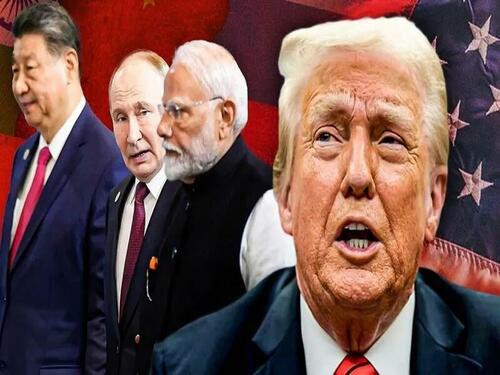Authored by Andrew Korybko via Substack,
The US’ latest sanctions against Russia, the first under the second Trump Administration, are intended less as a weapon against the Russian economy and more as a means of weaponizing energy geopolitics in a bid to break apart BRICS, especially its Russia, India, China (RIC) core. This assessment is based on India and China’s close trade ties with the US in spite of its respective 50% and 55% tariffs on them, their continued rivalry despite their incipient rapprochement, and their triangulation with Russia.
In the order that they were shared, India’s and China’s trade with the US is much larger than their trade with Russia, but Russia importantly supplies a significant share of their energy.
While neither wants to pay more for oil, however, the overall costs of the US raising its tariffs on them as punishment for defying its latest sanctions as well as the secondary ones that could be leveled against those of their financial institutions that facilitate this trade might be even more. This could arguably compel them to reconsider.
As for the second point, being in better graces with the US than the other is with it serves their interests vis-à-vis one another since neither wants to risk the scenario of their rival teaming up with the US against them, which could have strategic implications. They might therefore calculate that they have more to lose by defying the US in pursuit of lower oil prices and retaining closer ties with Russia if the other doesn’t too so it’s better to comply. This amounts to a weaponization of the prisoner’s dilemma.
Building upon the above, the last point is that each might have accordingly calculated that their rival won’t obtain better ties with Russia at their feared expense so long as both of them informally comply in part (key qualifier) with the US’ latest sanctions, which each might do in spite of publicly criticizing them. As it turns out, they were already decreasing purchases of Russian oil even before the sanctions, with India’s dropping 14% from August to September and China’s 8.1% in the first nine months of the year.
No matter how compelling these points might seem, nobody should assume that India and/or China will totally stop importing Russian energy, let alone right away. There simply isn’t enough supply on the market right now for them to do so. Even if others ramp up production, those two might still only gradually wean themselves off of Russian energy, which would then likely be sold at an even steeper discount to incentivize them to retain some purchases. Everything will therefore likely balance itself out.
Nevertheless, the US could still highlight India’s and China’s reduced imports under duress (the first’s confirmed by its top buyer and the second’s only reported) to debunk the BRICS myth of them all (especially RIC) working in harmony against the US, which Trump has complained about before. It doesn’t matter that such information warfare would have no tangible effect on global processes since all that’s important to Trump is the perception of the US having broken BRICS’ (and especially RIC’s) unity.
On that note, Russia’s special operation wouldn’t be curtailed even in the political fantasy that India and China soon dump its energy for good since the Kremlin has a big enough war chest to keep financing its side of the conflict for at least the next few years, though this might come with some opportunity costs. The takeaway is that the US is indeed weaponizing energy geopolitics in a bid to break apart BRICS, which it might succeed with in terms of optics, but this won’t make any substantive difference in reality.
Loading recommendations...
